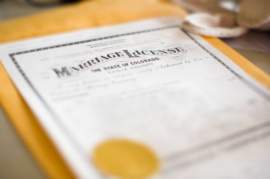
The Full Guide on Marriage Ceremonies

Popular In Marriage
Common Law Marriage Louisiana Common Law Marriage Massachusetts Common Law Marriage Nevada Common Law Marriage Ohio Marriage Certificate Common Law Marriage Kentucky Free Marriage Records Putative Marriage Definition Common Law Marriage Alaska Common Law Marriage Oklahoma Common Law Marriage Mississippi Common Law Marriage New Mexico
Marriage ceremonies take place in many cultures around the world. In fact, most cultures respect and admire wedding ceremonies. Couples and their families, pay close attention to detail when making wedding preparations. While ceremonies will vary in practice an in venue, the principles are generally very similar. Wedding ceremonies are utilized by couples in order to express their love and commitment for each other. In some cases, ceremonies are short and in others, wedding ceremonies can last for days. Cultures that have very long ceremonies, often have the wedding culminate in a large celebration that includes the entire town or tribe. Whereas, shorter ceremonies often include a reception with close family and friends, the same day. Wedding ceremonies will also differ according to a couples religion. In some cases, the main focus of a wedding ceremony is on the couples joint commitment to god and in others, the focus is simply on the couple. For many ceremonies, religion plays a key factor in readings, vows and tradition. In any religion, wedding ceremonies are important due to the nature of what takes place. Couples publicly proclaim their lifelong commitment to each other. In fact, that commitment is not meant to be influenced by any outside factors. Generally, wedding vows help couples to explain their level of commitment, while promising to only have that unique commitment with each other. While wedding preparations often give great consideration to the vows, couples must also make many other decisions. Those decisions include wedding attire, wedding invitations and venue for both the ceremony and the reception. In addition, couples will need to compile a guest list. The size of the guest list will likely influence many other decisions. For example, couples may select a venue because it can accommodate the number of guests they would like to invite. Therefore, the formality of the wedding venue may help the couple choose wedding attire. Once couples have made those decisions, they can select and mail their wedding invitations. In any case, couples will find that wedding preparations are time intensive and can also be stressful. However, couples must remember to focus on the real purpose of their wedding ceremony. The ceremony should be focused on a celebration of the love found in their unique relationship as a married couple.
Background:
Ceremonies that celebrate wedding vows, have been recorded throughout history.
In fact, there have been many changes in wedding ceremonies throughout history.
Those changes have been based on culture, religion, individual choices and
society. However, the purpose of wedding ceremonies remains fairly standard. In
general, wedding ceremonies are utilized for the same purpose now as they were
in the past. Wedding ceremonies are a time for couples to proclaim their love
and commitment to their relationship. Marriages are meant to be celebrated as
unique relationships in which neither spouse will have that same type of
relationship with anyone else. Marriage ceremonies help couples to solidify the
unique bond in their relationship. For religious couples, that bond is made
stronger by their commitment to God and the church. For other couples, the
commitment is made stronger by support offered from friends and family present
at the ceremony and ensuing celebration.
:
Many wedding ceremonies are based on similar principles. In fact, most
ceremonies follow outlines specific to the type of ceremony the couple has
selected. Generally, wedding vows are the same or similar for couples that take
part in the same type of ceremony. Religious wedding vows general include
couples making a commitment to each other, the church and especially to God.
Couples that have selected a religious ceremony, are likely to have many other
religious elements included. First, their wedding ceremony is likely to be held
in a house of worship as certain religions will not recognize a marriage that
took place anywhere else. Couples can sometimes get approval from the church to
have their wedding ceremony somewhere else. However, church leaders prefer that
they have their wedding on consecrated ground in order to be sure that the
wedding is considered holy. Many religious wedding ceremonies include
prayer before, during and after the ceremony. Everyone present at the ceremony
is expected to tale part in the prayers, or to be respectful of the prayers at
the very least. In addition, there will likely be religious readings during the
ceremony. Religious texts are an important part of any wedding ceremony. Many
times, the person officiating over the ceremony, will read from religious texts
in addition to friends and family members reading passages throughout the
ceremony. Each religion will have specific requirements for weddings held in
their house of worship and each religion may allow slight variations. Couples
can expect that a religious wedding ceremony will focus on a harmony of faith,
God and their relationship.
:
Wedding ceremonies are important for several reasons. First, couples are given
time to declare their love in commitment to each other in a public forum. In
addition, couples are able to get support for their relationship from family
friends and religious leaders. Too many couples spend time focusing on
all of the small details included in the wedding day. Often couples forget to
give vows and other special elements of the day, the important attention they
deserve. Because there are so many steps involved in wedding preparations,
couples often leave some important details until the last minute. However, on
their special day, couples are not likely to notice the small, insignificant
details. In fact, married couples generally find that the most vivid detail of
the day, was when they said, "I do." Wedding days are important
because of what they mean for the future of the couples relationship. Wedding
days are the beginning of a lifetime together. Couples that remember those
details when planning their wedding, will likely remember the important details
of their special day.
:
Generally, wedding vows are the culmination of the wedding ceremony. Previous
to wedding vows, the individual officiating over the ceremony is likely to have
told stories or given religious advice on marriage. In addition, family members
or friends of the couple, may have given speeches or read applicable passages
from a religious text. In fact, there are generally many steps that lead up to
the couple exchanging vows. At the end of the ceremony, couples take part in
agreeing to very specific vows. Those vows reiterate their lifelong commitment
to each other, and possibly to their church and God. That commitment is not
suppose to falter due to any outside factors including wealth, illness or the
influence of other people on their relationship. In vows, couples make
declarations of a commitment to each other, that is meant to last a lifetime,
despite any outside influences. Couples agree to love and honor each other in
any circumstance. For most couples, the most important purpose of a wedding
ceremony, is to proclaim their vows to one another.
:
Couples that have chosen to get married, will find that weddings involve many
preparations. Couples must decide what type of wedding ceremony they would like
to have. Couples must also select a venue based on that decision. If a couple
has decided to have a religious ceremony, they will likely have their ceremony
at a religious venue or on consecrated ground. Other couples may decide to have
their wedding outdoors or at an event center. Couples must consider price and
location of both their wedding venue and the location for their reception. In
some cases, couples have their ceremony and reception at the same
location. Next, couples must make a guest list, including the selection
of the bridal party. At some point, couples will need to decide if they
plan on writing their own vows. Couples must select appropriate attire
and the level of formality for their event. That decision will likely effect
their selection of flowers and food dishes available at the reception. Couples
must also make seating charts based on what type of seating is available at
their wedding venue. Last but not least, couples must select wedding
invitations and send them out. As guests return their invitations, couples will
likely adjust their seating chart for their guests, so that they can be seated
with people they are likely to get along with.
Wedding Dresses:
In many cultures, the selection of a wedding dress is very important. In fact,
many brides spend large amounts of time on the decision. In some cases, brides
use a wedding dress that is a family heirloom. Brides may make that decision
because a family member can't be present at the wedding, due to death or
distance. By using a family heirloom, brides attest to the importance of family
in their lives. In other cases, brides have their dress hand made to suit their
specific desires. Brides in many cultures choose a white, or variation of
white, wedding dress that is long to ensure a modest appearance. It is said
that the tradition started because white signifies purity and chastity. Yet,
some brides select other colors for their wedding dress. These days, brides are
able to select any color dress, with little scrutiny form guests. In other
cultures, brides frequently wear brightly colored dresses to celebrate their
wedding. For example, many Japanese brides have traditionally worn bright red
dressed for their wedding ceremony. However, white wedding dresses are becoming
increasing popular and accepted around the world.
Invitations:
Selecting a wedding invitation, can be rather simple for most couples. In
general, wedding invitations should match the formality of the ceremony. Very
formal weddings often involve fancy and detailed invitations. However, the most
important factor in selecting a wedding invitation, is making sure there is
enough room to list pertinent details. While, wedding invitations contain many
details that pertain to a couples wedding day, all information is not usually
listed on the invitation itself. The invitation itself will list names, date
and location of the wedding ceremony. However, wedding invitations generally
contain other documents such as directions to venues and hotels in the area. In
the past, wedding invitations simply stated the date, time and location of the
event because ceremonies tended to be more simple. Currently, wedding
invitations contain a myriad of other information. In addition to the standard
information, wedding invitations will also list the locations at which couples
have registered for gifts. This is done to avoid repeat gifts, or gifts that
will not be appropriate to the couple. In many cases, guests are also able to
make meal selections for the reception. The depth of information available with
a wedding invitation is up to the couple. However, the more information they
provide, the less likely their guests are to encounter difficulties on their
wedding day.
:
Couples are likely to select their wedding venue after they have determined
what kind of wedding they would like to have. Couples generally choose between
a religious venue, an outdoor location and event venues that are utilized for
weddings. In concurrence with that decision, couples usually decide where they
will have their reception. Many times, couples have the wedding ceremony and
reception in the same place, or in locations that are located close to each
other. There are many factors to consider when selecting venues. Couples must
consider the size of their guest list, to be sure that their venue can accommodate
it. In addition, couples should be sure that the venue falls within their
budget. Couples should pay careful attention to detail when selecting a venue,
as it will set the tone for their special day.



















